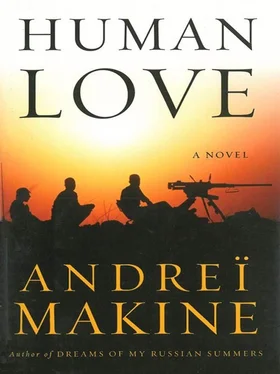They do not switch on the lights, and in the darkness Elias can see Annas eyes, her gaze lost in an invisible procession of days, suns, moments.
“But what if we tried to go back?” It is suddenly hard for him to control his voice, although it is finally saying precisely what he wanted to say An improbable but unbelievably real, true, and vital dream. He tries to makt it less abrupt, to find a justification, an excuse for it. “You know, Anna, to tell you the truth, I shall soon have very little choice. There won’t be much of a future for the person IVe been all this time. Your country no longer needs me. Mine, governed as it is, will do everything in its power to make me disappear. So I’ll be forced to go back. I thought we could do it together…”
“Go back… But go back where?”
“Back to Sarma.”
He leaves her at nightfall. The streets are already almost empty, the same streets, he thinks, as twenty years ago, the same slow swirling of the snow…
A few dozen yards from his hotel three men suddenly block his path. Young, dressed in leather jackets. Heavy, wary faces. Elias steps aside slightly, feels his muscles tense ready for a fight. In a flash all the disgust for these Moscow brawls floods in: the collective beating up of a dirty negro. Except that now, facing these three cretins in their leather gear, there stands a body covered in scars, raked by bullets. He clenches his fists, lowers his chin.
“Excuse me. Can you change this for a few dollars?” Their English accents are comical, and indeed the whole performance makes their faces look singularly foolish. All three of them look like recalcitrant pupils taking an oral exam.
“No dollars,” he replies. “Just Mongolian tugriks!” He smiles, walks round the trio, who are lost in confusion over how to translate his reply. On arriving at the hotel, he goes to the bar and orders a drink.
In this country “a few dollars” has replaced the urge to smash a black persons face in. The progress is undeniable. He drinks, shuts his eyes. Deep within him these words that no longer belong to anyone resonate on their own in their fragile truth: “To go back… Back to Sarma…”
The days that followed our conversation in the burned-out house were filled with bombardments and gunfire, the panic of foreigners fleeing the city, the rage or despair of the Somalis staying behind there, often to be killed. I did not see Elias again, nor did I have time to think again about his words. Once only, in a brief grievous insight, I perceived that his love for Anna, their love, resembled that great gulf of the sky on the night we had spoken together for the last time. A superbly starry sky above a city that was getting ready to die. Like that black chasm, their love needed no words, too remote from the lives of human beings. Within myself I could feel a wariness, a doubt, the need for proof.
And yet I sensed that belief in this love was the ultimate belief of my own life, the faith beyond which nothing here on earth would have made sense any longer.
From the threshold of our shelter we had followed the shuffling of furtive footfalls in the street, shadows slipping along. Elias tilted his head back and murmured: “Do you remember the sky in Lunda Norte? Hold on, I’m going to find the constellation of the Wolf…”
A WHOLE LIFETIME SEPARATES ME FROM THAT NIGHT in Somalia. Mogadishu in ruins, a capital that, with obstinacy, almost with relish, was committing suicide day by day. And now, at the other end of Africa, in a quite different Africa, the tranquil streets of Conakry, this big hotel facing the sea, the nauseating feeling of being a rich tourist in the tropics.
I see a constellation in the night sky as I move away from the glaring lights of the People’s Palace. A few seconds suffice for the realization to dawn that every one of our actions occurs beneath the giddy remoteness of these stars. And yet we do everything possible to forget this boundless judgment, to be judged only by ourselves. Long ago, in a city strewn with corpses, a man who was perhaps my only true friend and who had only a few days left to live pointed out the constellation of the Wolf to me and reminded me that we had already seen it on the night of our first meeting in the forests of northern Angola, that night when, still very young, I was so afraid to die… It was enough to let one’s gaze wander among these stars for the fear to begin to weaken and for death to seem temporary, provisional. Like our lives…
I hear footsteps on the gravel of the path that surrounds the palace. The young woman who is guiding our group of writers runs up to me and summons me to come quickly and take my place at the “African Life Stories in Literature” roundtable discussion.
The debate is already under way. For the first few moments I listen to it as if it were in an unknown language. In memory I am still at the side of the man who has only a few days to live as he gazes at the sky above the ruins of Mogadishu.
Little by little the meaning of what is being said becomes clear to me. Two viewpoints confront one another: the “afro-pessimists” and the “afro-optimists.” The latter are drawn from the ranks of the Africans comfortably settled in the West, globalized blacks, to some extent. The “pessimists” speak of colonization, slavery, négritude. The “optimists” give half-smiles as they listen to them. They call for self-projection into the future, a balanced perspective on the black man s burden, a reaching out beyond the historic divides between civilizations. The “traditionalist” pitch is the inexpiable guilt of the whites, the ancestral wisdom of the African… The card played by the “moderns” is a matter-of-fact view of the colonial past, the new Africa, the continent, in the words of one of them, “bubbling with vitality and with the libido of a geyser.” The public salutes him with a burst of applause and even several shouts of “Yeah!”
In the hall at the end of the front row I recognize the organizer with beet-colored hair, my neighbor at the hotel. She sits next to her friend, the Congolese artist. From time to time she consults her watch, then exchanges a little grimace of complicity with the young man, which means: “Once this palaver’s over, we’re off.”
Yes, a palaver, she’s not wrong. French is the language of the colonizer, complain the “traditionalists,” the white man’s weapon that has reduced African cultures to silence. The “moderns” retort: no, French is our trophy, our spoils of war. We can do with it what we like. French has violated our African mentality. No, anorexic French is being regenerated by an insemination of négritude. This turn of phrase comes from the Togolese writer who has just been talking about “the libido of a geyser.” It scores a bull’s-eye. A guffaw of approval ripples through the hall. The line of dark suits in the front row, occupied by the “fat cats of the international conference circuit,” stirs. Hissing chuckles can be heard from them. During the morning these men have concluded their important cogitations on sustainable development in Africa and now they are relaxing as they listen to the ranting of the novelists, who are simply geisha girls performing a few choice routines for them. Encouraged by the example of the Togolese writer, the participants in the discussion set about demonstrating Africa s fecundating powers. Anything goes: animist priests, whose magic enhances mens sexual performance; women’s exuberant beauty (“breasts, two great gourds filled with milk and honey,” one of the writers quotes himself); a cunning husband’s skill at provoking the rivalry between his wives. I learn that in one African country the men call their mistresses “offices,” and that in Congolese villages the daughter to be married off is nicknamed “the little dog.” The audience laughs, the novelists vie with one another. Repudiated wives, husbands betrayed with an uncle, a father, a brother, a son… Penises “like a bamboo stem,” sweat “trickling in rivulets between her shoulder blades and streaming into the groove between her buttocks as her lover grips them”… All this accompanied by talk of sorcerers, eclipses of the sun, dances and trances.
Читать дальше









